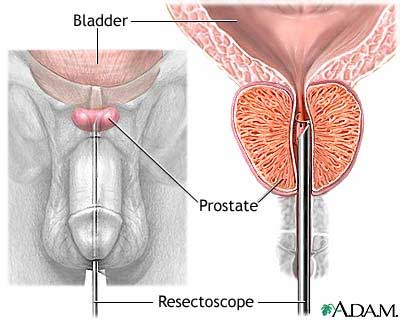
Difficulty in urination.
Symptoms: urinary frequency, hesitancy when urinating and lack of erection. Causes who really knows what starts any cancer off
The cause of prostate cancer is unknown, but hormonal, genetic, environmental, and dietary factors are thought to play roles. the following risk factors have been linked with development of this condition:
Age: there is a strong correlation between increasing age and developing prostate cancer. the incidence of prostate cancer increases steadily from fewer than 1 in 100,000 for men aged 40 years to 1146 per 100,000 in men aged 85 years. the median age at diagnosis of prostate cancer is 70.5 years. more than 80% of prostate cancers are diagnosed in men older than 65 years. Autopsy records indicate that 70% of men older than 90 years have at least one region of cancer in their prostate.
Race: African American men are 1.5-2 times more likely than white men to develop prostate cancer. African American men also appear to develop prostate cancer at an earlier age.
Genetic factors: Men who have a history of prostate cancer in their family, especially if it was a first-degree relative such as a father or brother, are at an increased risk. This risk may be 2-3 times greater than the risk for men without a family history of the disease.
Diet: A diet high in fat has been associated with an increased risk of prostate cancer.
Chemical agents: Exposure to chemicals such as cadmium has been implicated in the development of prostate cancer.
There is no proven link between frequency of sexual activity and prostate cancer risk
Most men with prostate cancer have no symptoms. This is particularly true of early prostate cancer.
Most prostate cancers are discovered incidentally when a digital rectal exam is performed.
A digital rectal exam is part of a thorough regular health examination. Digital refers to finger.
During the digital rectal exam, the examiner inserts a gloved and lubricated finger in the rectum to feel the prostate for abnormalities.
Symptoms usually appear when the tumor causes some degree of urinary blockage at the bladder neck or the urethra.
The usual symptoms include difficulty in starting and stopping the urinary stream, increase in frequency of urination, and pain while urinating.
The urinary stream may be diminished (urinary retention), or it may simply dribble out.
Even after urination, there is a sense of bladder fullness because the bladder has not been fully emptied.
Less common symptoms are blood in the urine (hematuria), painful ejaculation, or impotence (inability to have an erection).
These 3 symptoms are uncommon in early stages of the disease. they usually occur when the cancer is advanced.
As the cancer advances to cause a greater blockage, bladder function may deteriorate further.
Men with such advanced cancers sometimes experience recurring urinary tract infections.
Despite these symptoms, many men do not seek medical care until the cancer has spread. Symptoms of metastatic disease include fatigue, malaise, and weight loss. Spread to the bones causes deep bone pain, especially in the hips and back, and bone fractures from weakening of the bone.
my uncle was diagnosis at 28 with p cancer he was extermely overweight
my father in law had prostate cancer 6 years ago, he had difficulty passing water, and alot of griping pains around his bladder region, he had radiotherapy and is still okay today, it is one of the most treatable cancers, sometimes if left too long it can go into your bones the cancer but i have to STIPULATE, this is not common and it never happened to my father in law, he was just told this at christies.
The cause is old age, the symptom is you fail a PSA blood test.
some times its only found through a blood test called Psa and you can have symtoms like not passing water properly or bladder pain my brother found out about his while seeing his uroligist over a bladder pain after him having kidney stones .hope this helps you.